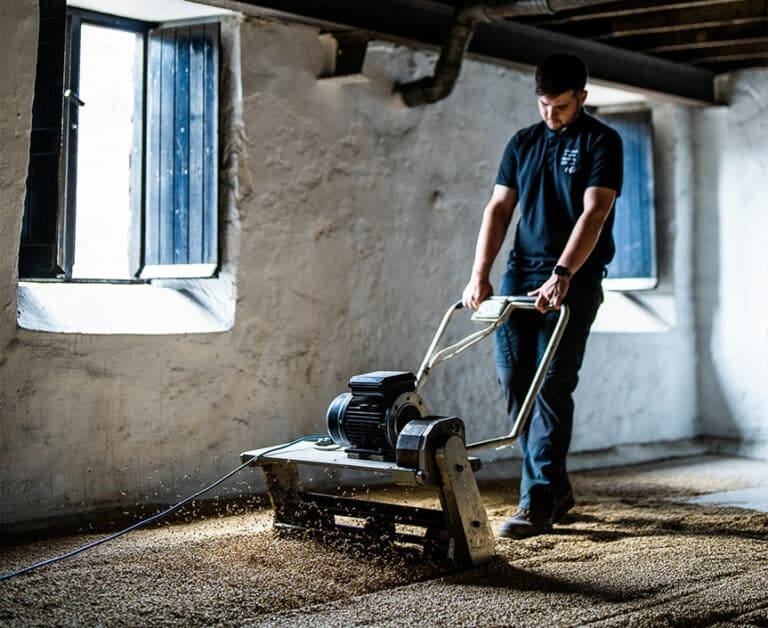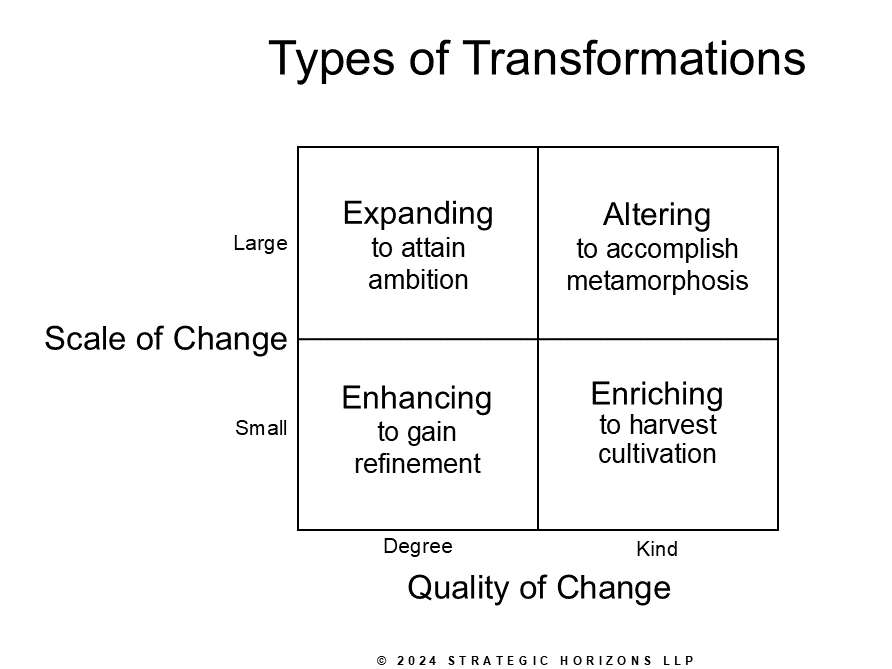Types of Transformations
From Experiences to Transformation Offerings, Part Three
This post continues the chapter on the Delta Model, tentatively entitled “From Experiences to Transformation Offerings”. It follows the Introduction to the Delta Model and the box on Quasi-Transformations, and is a direct response to Types of Aspirations, Part One and Part Two.
The latter two will go in an earlier chapter on understanding aspirants, and showed how aspirations can be for refinement, ambition, cultivation, or metamorphosis. This newframework that shows what type of transformation you need for each one of these, with the discussion for metamorphic transformations coming in the next post.
Note that in the three Thesauri below — which I intend on (maybe) being “boxes” in the book, set apart from the text — the lists of words are supposed to be in tables. Substack apparently doesn’t support that, so I apologize for their length, with one word per line.
Joe
================
Types of Transformations
With that understanding of how to ensure transformative experiences arising from the bottom segment of the Delta Model fit within a full transformation offering, let’s turn now to how to think about full transformation offerings. While there are many ways to look at categorizing transformations, a most useful one is the four Types of Aspirations mentioned above and fully discussed in Chapter 4, where the middle segment of the Delta model encompasses each of the non-metamorphosis aspirations for refinement, ambition, and cultivation. We’ll discuss metamorphic transformations in the next section.
How you approach customers should differ on which type of aspiration they have. For refinement aspirations, you need to enhance some element of identity aspirants already have to gain a refinement in it. For ambition aspirations, you need to expand some capability aspirants exemplify now in their identity to attain their ambition for what it could be in the future. And for cultivation aspirations, you need to enrich aspirants in some new arena of identity to harvest cultivation of that arena.
How you approach customers should differ on which type of aspiration they have.
Enhancing Transformations
As shown in the model, aspirations of refinement represent a small-scale change in degree. These are the exact opposite of metamorphosis, the desire not for wholesale change but of refining some aspect of self, something already there that you again enjoy, relish, care for, delight in, or even love.
Being small in scale, enhancing transformations lend themselves to short-term sets of transformative experiences. I think of the prototypical example as an academy, or other similar such places as a camp, institute, online course, certification class, or workshop. I’ve attended a couple of 3-day golf academies, for example, to enhance my game (without, it should be noted, any ambition for it taking me to another level). Others – adults and youths alike, recreationally and professionally – go to a tennis school, participate in a basketball camp, use a coding class to learn a new language, obtain a professional certification, enhance their skills at a mathematics institute, partake in a hobby workshop in a retail store classroom, and so forth.
Enhancing transformations lend themselves to short-term sets of transformative experiences
Sami Vesala, a friend of a friend in Finland, once excitedly told me about an enhancing transformation he had. He had long enjoyed whiskey, so when on vacation in Scotland he visited many different distilleries. To Sami, though, the Springbank Distillery in Campbeltown felt different, and at the end of the admission-feed tour he heard it had a 5-day whiskey school. In desiring to learn more about whiskey and distilling – and this unique distillery as well – several years later he paid €1500 to spend a week at the Springbank Whiskey School where he and a handful of others worked at the distillery for five days. They participated in the real labor of malting, peating, mashing, and distillation, as well as warehousing and bottling. (This is an example of what Jim Gilmore and I have long called “paying labor” – an experience so distinctive and interesting people gladly pay to work there![1])
Sami said “the week itself was more than worth every penny” in no small measure because “the feeling of getting accepted as a part of the distillery ‘family’ was genuine”; he’s even still in touch with some of the Distillery’s workers. The experience enhanced his knowledge and appreciation of whiskey and how it’s made, and moreover “really changed my view on the whiskey business in general and highlighted the uniqueness of Springbank”.
Now I’m sure the Springbank Whiskey School doesn’t view itself as in the transformation business, but instead wants to offer a very high-value experience that bonds guests to its brand and its offerings. That’s its aspiration, and I’m sure almost everyone who goes knows it and is a willing participant. Many guests of such experiences around the world, however, have their own aspirations going beyond having a great experience, and how much more value could such experience stagers create if they intentionally catered to guest aspirations for refining transformations? And if they specifically designed their experiences to be transformative, sparking aspirations for guests along the way?
The best way to turn experiences into transformations is through encapsulation
The best way to do that is through encapsulation as discussed in the previous chapter. Provide resources for guests to prepare for the experience in advance, specifically encouraging them to think about the possibilities for change in viewpoints, comprehension, capabilities, and/or appreciation. Offer opportunities for reflection at each stage in the experience, such as after each work effort (or at the end of each day) at the Springbank Whiskey School, with group reflection with the fellow participants especially effective during the experience. Then afterward, provide resources for further reflection on the entire experience, plus ways for guests – who by this point would almost all have become aspirants! – to integrate the experience in their lives. This can be done via handouts, emails, website links, and even live one-on-one or group sessions done remotely. And in cases such as Springbank, it also wouldn’t hurt to provide some samples-as-memorabilia to both cement memories and stimulate integration.
When you guide enhancing transformations to gain refinement, think of your role as a business and the roles of your aspirant-facing workers as one of expert. Customers come to you because they seek the expertise necessary to gain the refinement, looking for you to direct, instruct, lead, and interpret in ways that take them to an enhanced level of whatever element of identity they want to refine.
When you guide enhancing transformations, think of your role as an expert
As an expert, you must watch out for thinking they want to take full advantage of your expertise and thereby doing too much for your aspirants, treating it as an expanding transformation when they only desire an enhancing one. On the other hand, you may also find that your work on the enhancing transformation causes the aspirant to desire more, to shift into an ambition aspiration to become an expert themselves. That can provide an opportunity to extend or offer a new transformation to do exactly that.
Understand too that all this applies to negative aspirations of refinement, as sometimes people desire small-scale changes that, for example, correct flaws, decrease unhelpful behaviors, or diminish bad habits. Knowing which way the transformation goes is crucial to designing the right set of transformative experiences for whatever type of academy you create (physically or virtually), what you do for encapsulation, and how you apply your expertise.
===========================================================
Thesaurus of Enhancing Transformations
Each of the four types of transformations tend to have certain words that aspirants use to identify in which quadrant of the Types of Transformations their aspirations lie – and therefore also what words you may want to use in promoting, selling, and guiding any type-specific offerings. For enhancing aspirants to gain refinement, here are typical words you might hear and use (but by no means an exhaustive list):
Adapting
Adjusting
Correcting
Decreasing
Developing
Diminishing
Distilling
Elevating
Enhancing
Filtering
Fine-tuning
Furthering
Honing
Improving
Increasing
Lessening
Polishing
Progressing
Purifying
Raising
Reducing
Refining
Sharpening
Shrinking
Touching up
Tweaking
Upgrading
Note that a few of these words have negative, not positive, connotations – correcting, decreasing, diminishing, etc. – for some refinement aspirations have to do with eliminating things you do not enjoy, relish, or delight in, but dislike and even detest.
============================================================
Expanding Transformations
For both enhancing and expanding transformations, the task is more straightforward than those that involve a change in kind, in the sense that the customer already is what they aspire to become – a golfer, an engineer, a religious person, a lover of impressionist art – and wants to be more of that in some sense. It’s still important to differentiate between refinement and ambition aspirations, to understand the scale of what aspirants seek. With ambitions, aspirants want to get significantly better at that dimension of self, gain an elevated level of achievement, or attain a certain high standing in a field or endeavor.
The prototypical example of an expanding transformation is the use of a personal trainer.





